
Question Number 201263 by mnjuly1970 last updated on 02/Dec/23
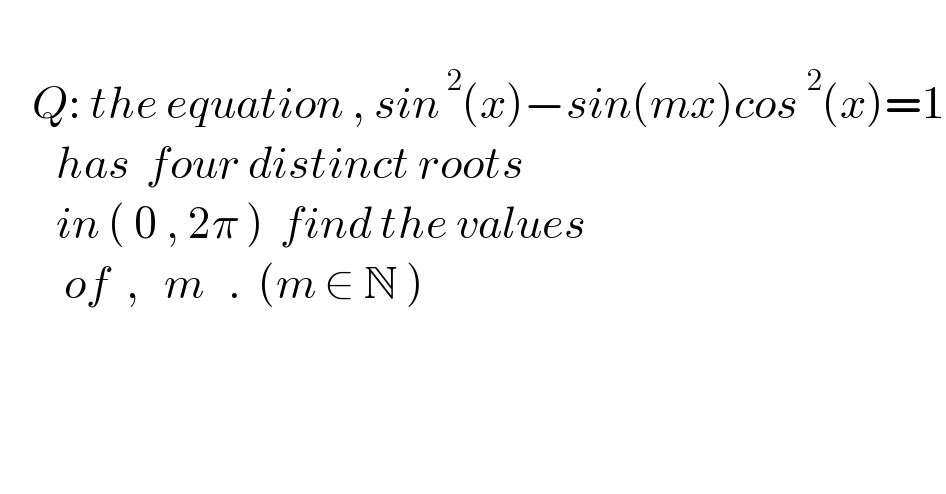
$$ \\ $$$$\:\:\:\:{Q}:\:{the}\:{equation}\:,\:{sin}^{\:\mathrm{2}} \left({x}\right)−{sin}\left({mx}\right){cos}\:^{\mathrm{2}} \left({x}\right)=\mathrm{1} \\ $$$$\:\:\:\:\:\:\:{has}\:\:{four}\:{distinct}\:{roots} \\ $$$$\:\:\:\:\:\:\:{in}\:\left(\:\mathrm{0}\:,\:\mathrm{2}\pi\:\right)\:\:{find}\:{the}\:{values} \\ $$$$\:\:\:\:\:\:\:\:{of}\:\:,\:\:\:{m}\:\:\:.\:\:\left({m}\:\in\:\mathbb{N}\:\right) \\ $$$$ \\ $$
Answered by MM42 last updated on 03/Dec/23
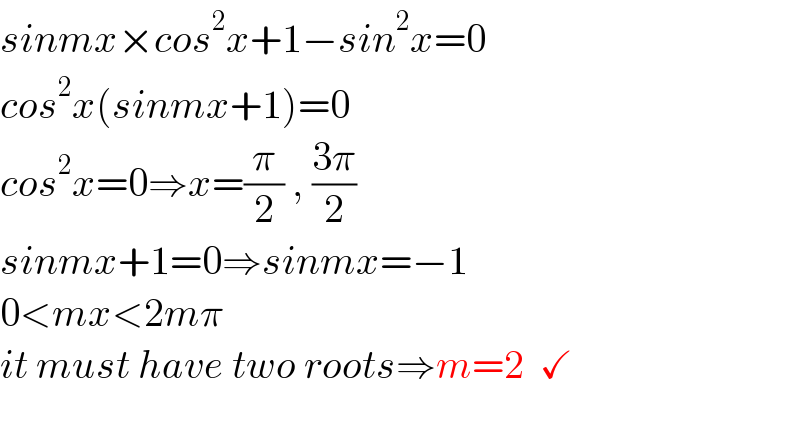
$${sinmx}×{cos}^{\mathrm{2}} {x}+\mathrm{1}−{sin}^{\mathrm{2}} {x}=\mathrm{0} \\ $$$${cos}^{\mathrm{2}} {x}\left({sinmx}+\mathrm{1}\right)=\mathrm{0} \\ $$$${cos}^{\mathrm{2}} {x}=\mathrm{0}\Rightarrow{x}=\frac{\pi}{\mathrm{2}}\:,\:\frac{\mathrm{3}\pi}{\mathrm{2}} \\ $$$${sinmx}+\mathrm{1}=\mathrm{0}\Rightarrow{sinmx}=−\mathrm{1} \\ $$$$\mathrm{0}<{mx}<\mathrm{2}{m}\pi \\ $$$${it}\:{must}\:{have}\:{two}\:{roots}\Rightarrow{m}=\mathrm{2}\:\:\checkmark \\ $$$$ \\ $$
Answered by mr W last updated on 03/Dec/23
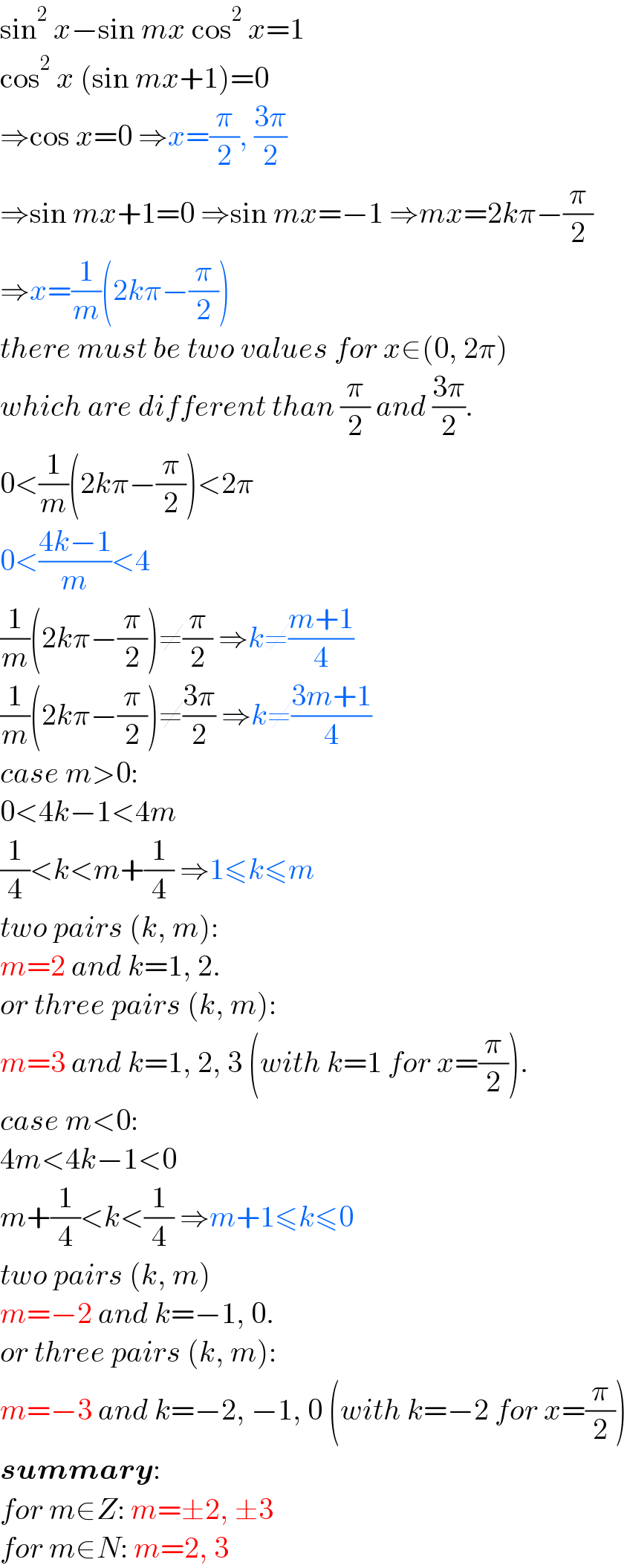
$$\mathrm{sin}^{\mathrm{2}} \:{x}−\mathrm{sin}\:{mx}\:\mathrm{cos}^{\mathrm{2}} \:{x}=\mathrm{1} \\ $$$$\mathrm{cos}^{\mathrm{2}} \:{x}\:\left(\mathrm{sin}\:{mx}+\mathrm{1}\right)=\mathrm{0} \\ $$$$\Rightarrow\mathrm{cos}\:{x}=\mathrm{0}\:\Rightarrow{x}=\frac{\pi}{\mathrm{2}},\:\frac{\mathrm{3}\pi}{\mathrm{2}} \\ $$$$\Rightarrow\mathrm{sin}\:{mx}+\mathrm{1}=\mathrm{0}\:\Rightarrow\mathrm{sin}\:{mx}=−\mathrm{1}\:\Rightarrow{mx}=\mathrm{2}{k}\pi−\frac{\pi}{\mathrm{2}} \\ $$$$\Rightarrow{x}=\frac{\mathrm{1}}{{m}}\left(\mathrm{2}{k}\pi−\frac{\pi}{\mathrm{2}}\right) \\ $$$${there}\:{must}\:{be}\:{two}\:{values}\:{for}\:{x}\in\left(\mathrm{0},\:\mathrm{2}\pi\right) \\ $$$${which}\:{are}\:{different}\:{than}\:\frac{\pi}{\mathrm{2}}\:{and}\:\frac{\mathrm{3}\pi}{\mathrm{2}}. \\ $$$$\mathrm{0}<\frac{\mathrm{1}}{{m}}\left(\mathrm{2}{k}\pi−\frac{\pi}{\mathrm{2}}\right)<\mathrm{2}\pi \\ $$$$\mathrm{0}<\frac{\mathrm{4}{k}−\mathrm{1}}{{m}}<\mathrm{4} \\ $$$$\frac{\mathrm{1}}{{m}}\left(\mathrm{2}{k}\pi−\frac{\pi}{\mathrm{2}}\right)\neq\frac{\pi}{\mathrm{2}}\:\Rightarrow{k}\neq\frac{{m}+\mathrm{1}}{\mathrm{4}} \\ $$$$\frac{\mathrm{1}}{{m}}\left(\mathrm{2}{k}\pi−\frac{\pi}{\mathrm{2}}\right)\neq\frac{\mathrm{3}\pi}{\mathrm{2}}\:\Rightarrow{k}\neq\frac{\mathrm{3}{m}+\mathrm{1}}{\mathrm{4}} \\ $$$${case}\:{m}>\mathrm{0}:\:\: \\ $$$$\mathrm{0}<\mathrm{4}{k}−\mathrm{1}<\mathrm{4}{m} \\ $$$$\frac{\mathrm{1}}{\mathrm{4}}<{k}<{m}+\frac{\mathrm{1}}{\mathrm{4}}\:\Rightarrow\mathrm{1}\leqslant{k}\leqslant{m} \\ $$$${two}\:{pairs}\:\left({k},\:{m}\right): \\ $$$${m}=\mathrm{2}\:{and}\:{k}=\mathrm{1},\:\mathrm{2}. \\ $$$${or}\:{three}\:{pairs}\:\left({k},\:{m}\right): \\ $$$${m}=\mathrm{3}\:{and}\:{k}=\mathrm{1},\:\mathrm{2},\:\mathrm{3}\:\left({with}\:{k}=\mathrm{1}\:{for}\:{x}=\frac{\pi}{\mathrm{2}}\right). \\ $$$${case}\:{m}<\mathrm{0}: \\ $$$$\mathrm{4}{m}<\mathrm{4}{k}−\mathrm{1}<\mathrm{0} \\ $$$${m}+\frac{\mathrm{1}}{\mathrm{4}}<{k}<\frac{\mathrm{1}}{\mathrm{4}}\:\Rightarrow{m}+\mathrm{1}\leqslant{k}\leqslant\mathrm{0} \\ $$$${two}\:{pairs}\:\left({k},\:{m}\right) \\ $$$${m}=−\mathrm{2}\:{and}\:{k}=−\mathrm{1},\:\mathrm{0}. \\ $$$${or}\:{three}\:{pairs}\:\left({k},\:{m}\right): \\ $$$${m}=−\mathrm{3}\:{and}\:{k}=−\mathrm{2},\:−\mathrm{1},\:\mathrm{0}\:\left({with}\:{k}=−\mathrm{2}\:{for}\:{x}=\frac{\pi}{\mathrm{2}}\right) \\ $$$$\boldsymbol{{summary}}: \\ $$$${for}\:{m}\in{Z}:\:{m}=\pm\mathrm{2},\:\pm\mathrm{3} \\ $$$${for}\:{m}\in{N}:\:{m}=\mathrm{2},\:\mathrm{3} \\ $$
Commented by mr W last updated on 03/Dec/23
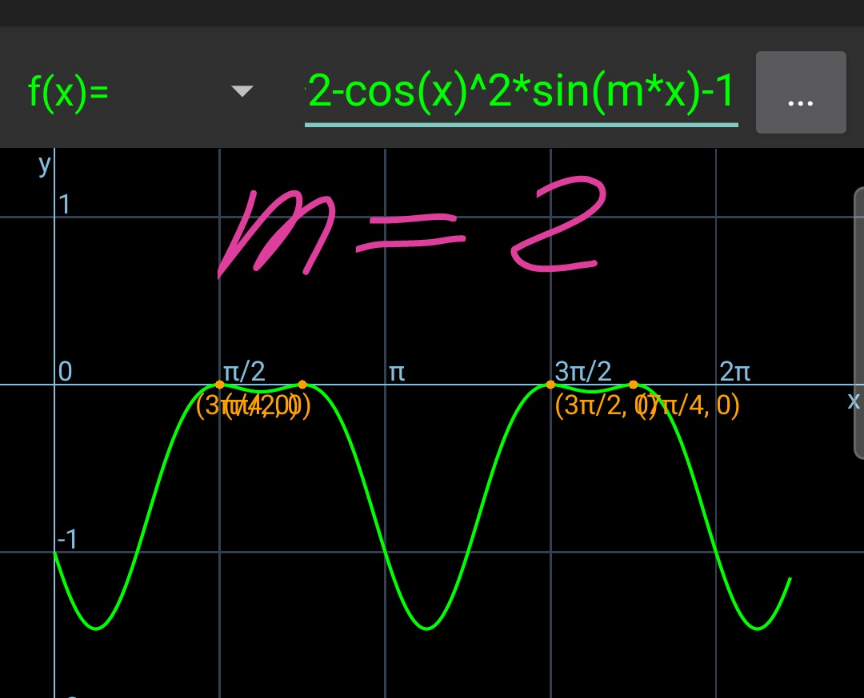
Commented by mr W last updated on 03/Dec/23
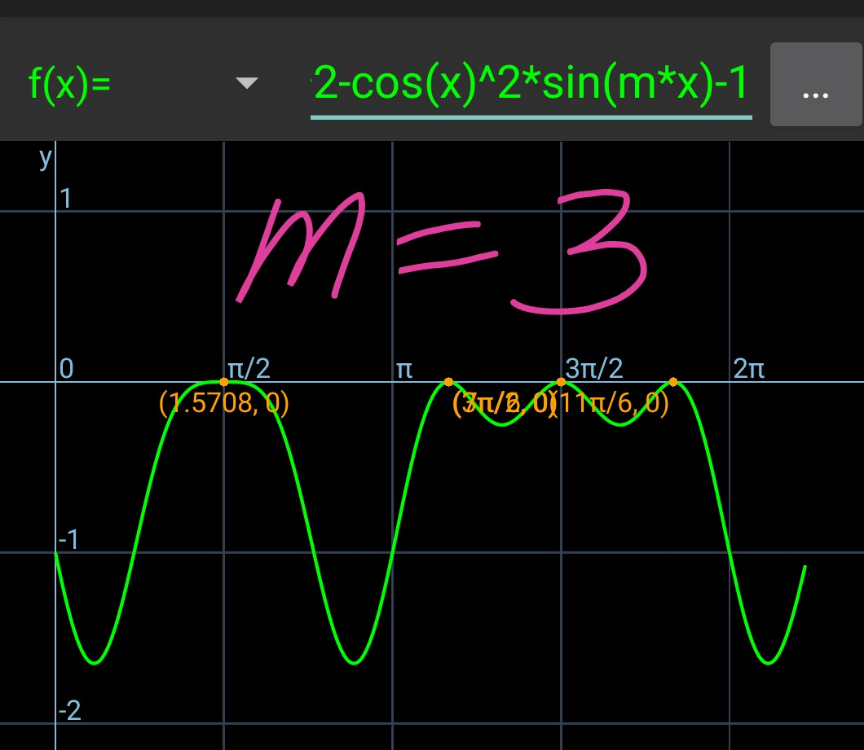
Commented by mnjuly1970 last updated on 03/Dec/23

$${thanks}\:{alot}\:{sir} \\ $$
Commented by mnjuly1970 last updated on 03/Dec/23

$${excelent}\:{sir} \\ $$
Commented by MM42 last updated on 03/Dec/23

$$ \\ $$$$\:\cancel{\lesseqgtr} \\ $$
